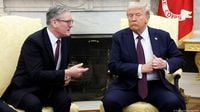US President Donald Trump announced what he called a "breakthrough" trade deal with the United Kingdom on May 8, 2025. During a joint video link with UK Prime Minister Kier Starmer, Trump stated that the "final details" of the agreement were still being "written up." The modest deal retains the 10% tariffs on UK imports but slightly increases access to agricultural goods for both countries and lowers duties on UK car parts. In a significant move, the UK reduced tariffs on US goods from an average of 5.1% to 1.8%.
Trump emphasized that the deal affirms that "reciprocity and fairness is a vital principle of international trade," adding that it will enhance access for US agricultural products. He also promised that the finalization of the agreement would occur "in the coming weeks." Starmer, appearing enthusiastic about the deal, described it as "a really fantastic, historic day," highlighting that it "delivers on the promise to protect" UK carmakers and steel manufacturers.
A British official indicated that the UK is considering further reductions in tariffs on US cars and cutting the digital sales tax affecting US tech companies. This move comes as the UK seeks to expand its global trade ties post-Brexit, having already secured a free trade agreement with India earlier in the week.
In April 2025, Trump had announced broad tariffs on US trading partners, but most were later reversed or paused to allow for negotiations. The 145% levy on Chinese imports, however, remains in effect. As the US and China prepare for trade talks in Switzerland on May 10, 2025, investors are keenly watching whether Trump can deescalate the trade war that has caused turmoil in global markets.
On May 9, Trump suggested he might lower tariffs on Chinese imports to 80%, a significant reduction from the current 145% levies, which can reach as high as 245% on some goods. He posted on his Truth Social platform, "80% Tariff on China seems right!" The potential tariff cut comes as US Treasury Secretary Scott Bessent prepares to meet with China's Vice Premier He Lifeng in Geneva to address the ongoing trade conflict.
White House Press Secretary Karoline Leavitt clarified that Trump would not unilaterally reduce tariffs without concessions from China. "As for the 80 percent number, that was a number the president threw out there. And we'll see what happens this weekend," she noted. The high tariffs have effectively created a trade embargo between the two nations, with shipping data indicating a slowdown in the flow of goods from China to the US.
Bill Reinsch, a senior advisor at the Center for Strategic and International Studies, commented on the deteriorating relations between the US and China, stating, "We have trade-prohibitive tariffs going in both directions." Meanwhile, Xu Bin, a professor of economics and finance, pointed out that China is the only country applying tit-for-tat tariffs against Trump's tariffs.
The upcoming talks in Switzerland are expected to focus on de-escalation rather than a comprehensive trade deal. The head of the World Trade Organization (WTO) welcomed the discussions as a "positive and constructive step toward de-escalation," emphasizing the importance of sustained dialogue between the world’s two largest economies.
As the situation unfolds, the implications of these trade deals and negotiations will be closely monitored by market analysts and global investors. The UK government views the trade deal with the US as a crucial step in securing its economic future following Brexit. A Downing Street spokesperson reiterated that the United States is an "indispensable ally for both our economic and national security."
In summary, while Trump and Starmer herald the trade deal with the UK as a significant achievement, the broader context of ongoing trade tensions with China looms large. The outcomes of the upcoming negotiations in Switzerland could reshape the landscape of international trade and the relationships between these powerful nations.




